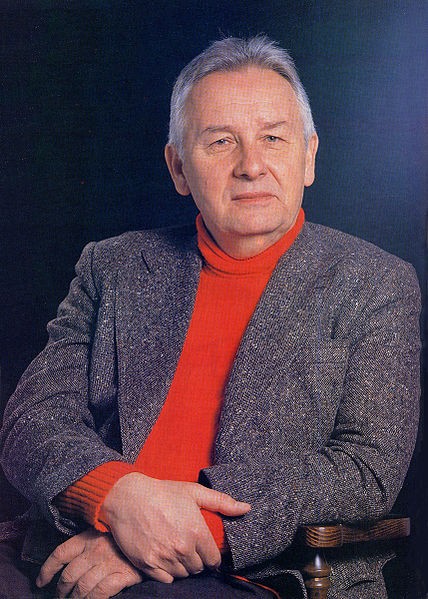Sorrowful songs: Henryk Górecki, 1933-2010

When radio stations started playing Henryk Górecki's Symphony no. 3, known as the Symphony of Sorrowful Songs, it was reported that drivers would pull off the road because the haunting, mournful music left them in tears. A 14-year-old Swedish burn victim wrote to Górecki to say that the Third Symphony was what kept her alive. The 1992 Elektra Nonesuch recording of the work, with American soprano Dawn Upshaw singing the soprano part, sold over a million copies and climbed to the top of the classical charts in both the U.S. and the U.K.
The composer, who died November 12 at the age of 76, was not known well outside his native Poland until his success with the Third Symphony. Written for orchestra and soprano solo, the work is a memorial to the victims of the Holocaust. The theme is the separation of a mother from her child. It draws on the words a girl had written on a prison wall in southern Poland: "Oh Mamma do not cry—Immaculate Queen of Heaven support me always."
Read our latest issue or browse back issues.
Early in his career Górecki wrote dissonant, avant-garde music that was not always received well by critics and was despised by the communist regime in Poland. By the mid-1970s he shifted to a more minimalist style, often writing with sacred themes and drawing on Polish folk music and church music. He came to reject the dissonant, 12-tone serialism that he had absorbed in his own training, favoring romantic but sparse sounds and the chantlike repetition of musical motifs. His later minimalist style is often associated with contemporaries like Olivier Messiaen (with whom he studied), Arvo Pärt and John Tavener, although he himself felt greater affinity with Bach, Mozart, Haydn and Schubert.
Górecki's most important choral work is Miserere (1981), written for an eight-part a cappella chorus. It was a response to the events of March 1981, when government militia attacked a demonstration by members of Rural Solidarity. Like much of his work, Miserere is a slow, meditative piece. It contains but five words: "Domine Deus noser, miserere nobis" (Lord our God, have mercy on us).
The work is written for eight parts, each having its own melody, which enter in turn, starting with the basses. As parts are added, the sound becomes thicker and more lush, yet brighter too as the treble voices join the men. The words "Miserere nobis" are poignantly reserved until the very end. Because of political restrictions, the work couldn't be performed until 1987.
Górecki's life was intertwined with that of his countryman Karol Wojtyla, cardinal of Kraków, who became Pope John Paul II in 1978. In 1977 Wojtyla commissioned a work by Górecki to mark the 900-year anniversary of the martyrdom of St. Stanislaw. That work, Beatus Vir, a psalm for baritone, choir and orchestra, was based on words from the Psalms, ending with "Blessed is the man who trusts in thee." Dedicated to John Paul, it was first performed in Kraków in 1979 for John Paul's first visit to Poland as pope.
The commercial success of the Third Symphony made it possible for Górecki to retire to his beloved Tatra Mountains. Much of his life he struggled with health issues. In a childhood fall he dislocated his hip. The injury was misdiagnosed for years, which led to an extended hospital stay and four operations, and he was left with permanent damage. His health challenges led him to say that he had "talked with death often."
Górecki never attempted to duplicate the commercial success of his Third Symphony. He "represented a totally independent voice. He only listened inward," said David Harrington, founder of Kronos Quartet, for whom Górecki wrote three commissioned works.
"Let every listener choose that which interests him. I have nothing against one person liking Mozart or Shostakovich or Leonard Bernstein, but doesn't like Górecki," Górecki said in a 1994 interview. "That's fine with me. I, too, like certain things."






